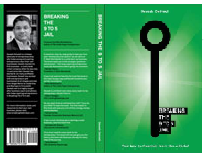Interview With The Startup Attorney – Doug Bend
Posted Under: Interviews
– What are the legal basics you should cover if you’re planning to start business along with your day job?
– Can your employer take away your startup or property built out of your side project?
– What are your legal rights and responsibilities for your day job and the side business?
– What’s the best way to tell your employer about your side gig?
– Where to go if you need more legal help but can’t afford it…
And many more such legal questions that don’t let aspiring entrepreneurs sleep at night are answered in this interview where I had the opportunity to chat with Doug Bend, the startup and small business attorney. You can find him on Twitter @DougBend and read on now to make sure you’re covered.
DD: Doug, thank you so much for joining us for the chat, how are you doing?
DB: I’m doing great thank you so much for having me and I’m so excited to be part of this. I have been following all the work you have been doing and happy to contribute.
DD: Awesome! Why don’t we start with you telling us a little about yourself, what you do, how you help starting entrepreneurs and entrepreneurs, and we’ll take it from there.
DB: Sure, you bet, well as you said my name is Doug, I am an attorney, I have been practicing for about five years now. Went to law school at Georgetown and moved out to the Bay area to help startups and small businesses out and that is the focus of my practice. I have to tell I really enjoy it, I really enjoy what I do, I love helping people get their businesses off the ground and running and helping small business owners with their transactional needs so they can focus on their products and on their clients.
DD: Why did you choose to work with startups and small businesses?
DB: I think the reason I like it so much is I find so much of the law to be divisive and attorneys are fighting over the kids or the house and what I really like about what I do is you help businesses and products and create jobs and help people really realize their dreams. So a lot of clients come to the door and say hey I’m thinking about starting X company and you’re on their team to help make that happen and it’s very constructive and at the end of the day, end of the month you look back and say I helped build 4, 5, 6 great companies that are creating jobs for people and creating great products and I find that to be very fulfilling.
DD: So as you just mentioned that you have followed a little bit my work and what I do so you know that we are all about breaking the 9 to 5 jail, all about getting out of the rat race, so give us some idea of all the legal bases and how to cover them when you are looking at starting a business on the side while keeping your day job as an escape option.
DB: I think it’s tough, I think what it really comes down to at the end of the day people really only have two options when they have their job and they are starting a company on the side. They either decide to go stealth and do it without telling their employer and hope that their employer doesn’t find out or they are honest with their employer. Both approaches have a lot of advantages and disadvantages. I am really a fan of the honest approach and I will tell you why! I think anytime your business starts to get any sort of traction whatsoever your employer is going to find out and there is only so long you can keep it from them and when they find out they are going to be much more upset that you weren’t honest about it. I think taking the honest approach with employers is really the way to go because if you go stealth, don’t tell them they are going to find out eventually in most cases and they are going to be understandably very upset and you are going to take a risk of not only lose your job at that point and time but possibly being sued.
DD: I believe in the same that let them know because if you don’t tell them and they find out some other way they are going to be more upset and then covering your side or giving explanations would be much more difficult than actually coming clean in the very beginning say “hey you know, there is ___________ I am passionate about and I am working on it in evenings and weekends, it’s not as big but I just wanted to let you know”.
So,what is the best way to tell your employer? What are an employee’s duties & rights? What can I do just in case my employer doesn’t like that I am working on something on the side other than my job, how’d that work out?
DB: I think the real key to it is selecting the business on the side very strategically and what I mean about that is understanding that if you have a startup company on the side that is going to be a threat to your employer or direct competition or taking opportunity from that or taking clients, they are much more likely to not let you do that and not being ok with you doing that and running into much more legal problems. When you think about starting your company on the side if you really do want to keep your current job while you are getting it off the ground and running really thinking about what type of business is not going to be threatening to your employer, I think that’s step one. Two when you are going through that process of selecting what type of company to start really thinking about what type of businesses are going to allow you to have a job nine to five that you can start your business on the side. Starting a business that needs to be open nine to five, you need to be answering emails and phone calls during regular business hours probably isn’t the best fit for a startup of while you trying to keep a normal job. But a job that has much more flexibility that allows you to take care of your business when you get home at night from your normal job on the weekends, a job like that is not in direct competition which your employer it’s not going to be a threat to them, it’s much more likely to be acceptable to your employer and much more likely for them to be ok with you doing that on the side as long as it does interfere with your normal work job.
DD: I’m not an attorney and the one thing that I very often tell my clients is to look into their employment agreement because there is a lot of stuff that we sign, these are lengthy agreements that we sign in the beginning of a job. I have worked for Fortune 50 companies and I know nobody reads them, we take them home but don’t read them. So what is the best way to not read the agreement yet find what’s the meat of the agreement, what is it that I have signed, what are my rights, what I can and can’t do?
DB: I think in an ideal world you have an attorney advise you in a an ideal world. But of course the problem with that is attorneys are expensive and so you have an attorney look over every single document you sign you spend most of your income on attorney’s fees. But if you are able to find an attorney you trust that charges you reasonable rates to look over those documents it might be worth the fee upfront to really understand what you are getting into and for them to point out really where the pitfalls are and where you are going to get in the most trouble down the road and point out those provisions to you. If you are not able to afford an attorney if the resources aren’t there I think look over the agreements and the first point is that employment agreements are very biased towards the employer, it’s their attorneys that are drafting the agreements and its very favorable to the employers and so when you look at your agreement your first reaction will probably be oh my god I can’t believe that’s very favorable that’s pretty standard for employment agreement and if you are going to pick out one provision to really pay attention to out of the agreement I think it’s really a section that relates to how much work you can do at home and on your own time and some of those provisions are much more restrictive than others. Some of them go so far as to say anything you do outside of work that provides you with a profit, provides you with revenue is the property of the company even if it’s not related to the company y and I think those types of provisions are the ones you really need to keep an eye on if you have a goal of starting a company unrelated to your current company, on the side that doesn’t interfere with your current job. Some courts take a look at those really egregious provisions and say hey listen this is ridiculous this employer had this person sign this agreement and now they are suing them for doing something on a Saturday that’s completely unrelated to their day job but other courts can take a look and say hey look its contract they had an option to review it, they had a consideration they took a job and they agreed to it so those provisions have been upheld. So I think recognizing you can’t courts in that that situation and taking a look at that provision and really egregious absolutely everything the sun outside my employment you might want to push back a little bit on that. The second point on that is not only to look at the employment agreement but also take a look at the employee handbook and see what kind of restrictions are in the employee handbook in addition to the restrictions in the employment agreement.
DD: Great idea and actually that answers what I was going to ask you next can an employer really take away your business or the profits or are the content that you created or the product or the model or anything that you have created as your side project? Is it a far flung possibility or do you see that happening very often? What’s your thought?
DB: No it’s not far flung, it’s something to be very aware of and a typical lawyer response is it depends, right. It totally depends and it does depend on your employment agreement you signed, so you signed an agreement that has very very extremely broad provisions saying anything you do outside employment belongs to the employer and he agrees to that you are more likely to be a lose a project and the profits from the projects. Two back to my initial point when we started recognizing that projects that are in direct competition with your employer that are taking away clients and opportunities for your employer are the ones that will be the most problematic. If you sign an employment agreement anything I do outside work belongs to my employers then after that you go out start a company that is in the same industry, the same field, potentially broaching opportunities for your employer those are really the cases you are mostly likely trouble in and come after you and try to acquire what you can work on.
DD: Thanks for that great answer. Now you mentioned that lot of times resources are not available for the starting entrepreneurs. So, if I can’t afford to hire a lawyer and I don’t want to take Google’s advice on legal matters because they are too sensitive and on internet people just tend to ask and answer same questions in different ways until they hear what they wanted to hear in first place. What are some of the credible resources for legal advice that you recommend?
DB: I think that’s a very good point because an attorney who can afford someone who is very good SEO or they are very good SEO in their own right that’s having their articles pushed to the top of the searches you running might not be a qualified attorney answering that question and so kind of recognizing that just because they pop number one on a Google search for whatever you are searching for doesn’t mean that that’s the best source for relying making important decisions. First of all if you can afford an attorney that’s really the best route to go, someone who does these transactions again and again and again that can help you out. But if you can’t afford an attorney I think there is number of great resources out there. I am a really big fan of the NOLO book series and they available on Amazon for around $25 to $50 per book and they do a really great job of writing on different legal topics and their target audience is not attorneys, its people that are looking for self-help legal work and they really do a good job at doing as an explanation so even someone that is looking at hiring an attorney picking up a NOLO book in their area that have attorney working on I think is a smart idea because they are going to ask much more smart good questions and I think what makes NOLO so great to is they have that filter, they have editors, they have publishers. They are not just somebody posting a blog, there is a review process it goes through review process before you are reading it. Other types of websites that blog is submitted they have a list of editors that review the blogs for content and for accuracy relying on those types of posts is really a good way to go. Venture hats often has an intervene has articles on legal issues and they have been filtered by their review process and probably a little more reliable to have very big user base a very big reader base reading the articles so if there is something blatantly wrong it more likely to get flagged and then finally I think looking outside the interment looking outside of books is your local resources. A lot of nonprofits have programs to help out entrepreneur and looking in those which ones might be able to help you out and then finally also important is the SBA has a number programs that helpful for entrepreneur not only in the area of legal help but in marketing and bookkeeping and I would recommend any entrepreneur look into that. The two office for entrepreneur who is looking at getting a business off the ground and running to request in your area help with and the small business development center, once you are entrepreneur and you are off and running there is a wide variety of grants out there where they hook you up with everything from a marketing consultant to a law firm, a local law firm and they are paid for through the SBA to help the young entrepreneurs, to help small businesses out at no costs so take advantage of those resources.
DD: Thank you so much a couple of them I didn’t know of and when it comes to books on legal issues again I feel like maybe they have not been updated to mirror current laws but as you just mentioned since they go through review process they are a very great and credible source of information. So thank you so much Doug, was there anything you wanted to share with us and our audience.
DB: No I’m so excited to talk to you! Entrepreneurs are great! It takes a lot of courage to step out there and to really start growing a business and I just wish everyone the best of luck.
DD: Thank you so much Doug really appreciate you being here. Ladies and Gentleman this was Doug Bend and just a quick disclaimer because Doug is an attorney this interview and the all the information we have provided here does not create any relationship between you and Doug as an attorney and a client. All the information is because of the generosity of Doug and it’s for your education & information and it’s always recommended to hire a lawyer if you feel the need.
DD: Doug, did I say that disclaimer right?
DB: Are you sure you aren’t an attorney? That was pretty good.
DD: Thank you so much, Doug. Ladies & gentlemen, if you’re concerned about the legalities of starting a business while keeping your day job, definitely reach out to Doug at bendlawoffice.com and on twitter @DougBend
Success to all!



 Sep 17, 2011–!>
Sep 17, 2011–!>


